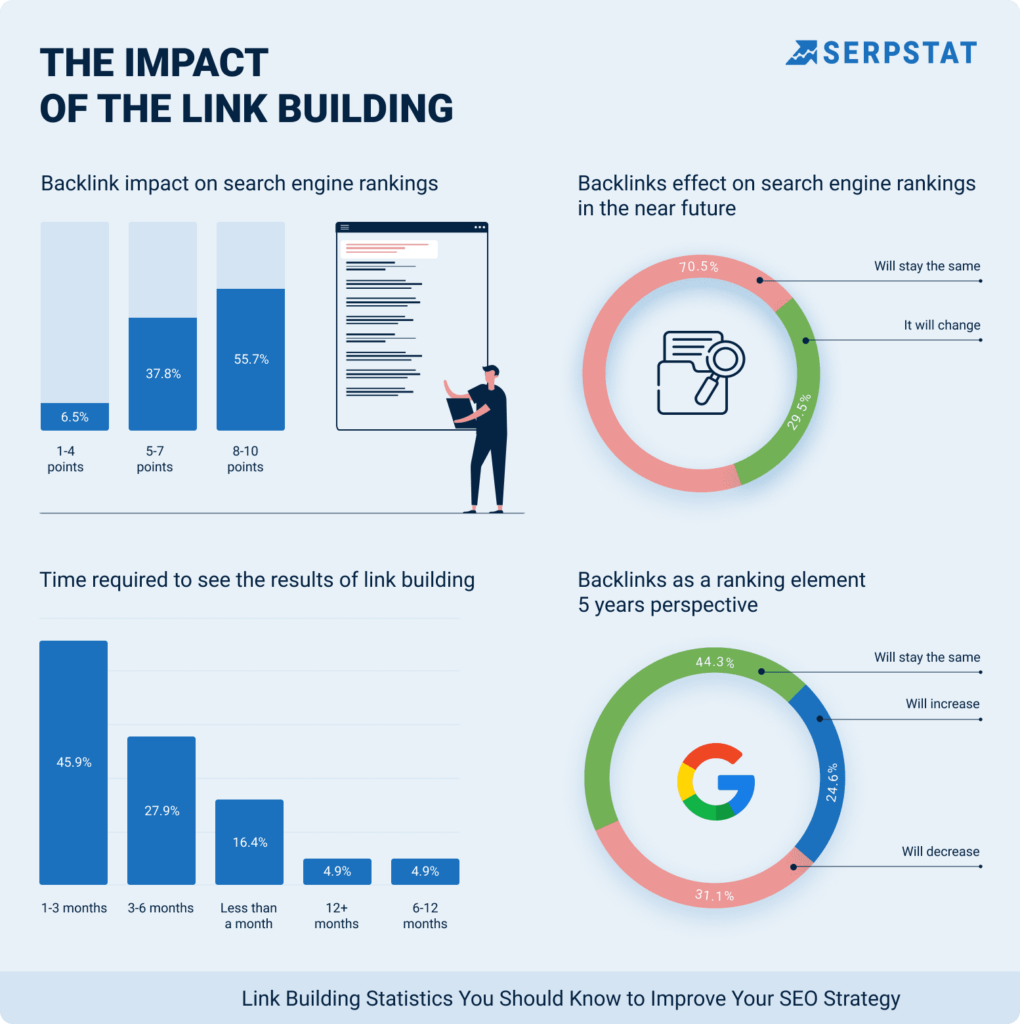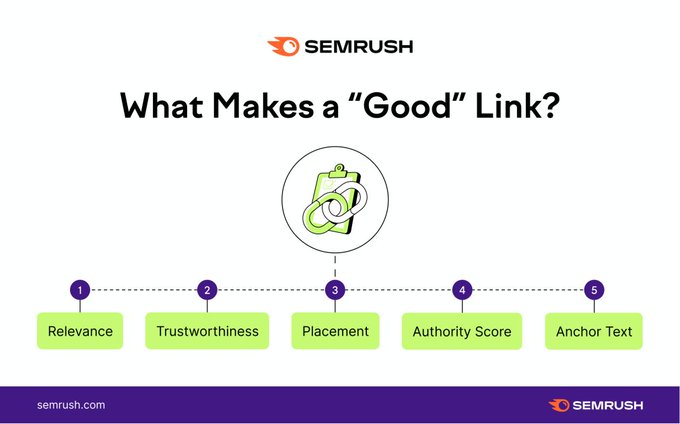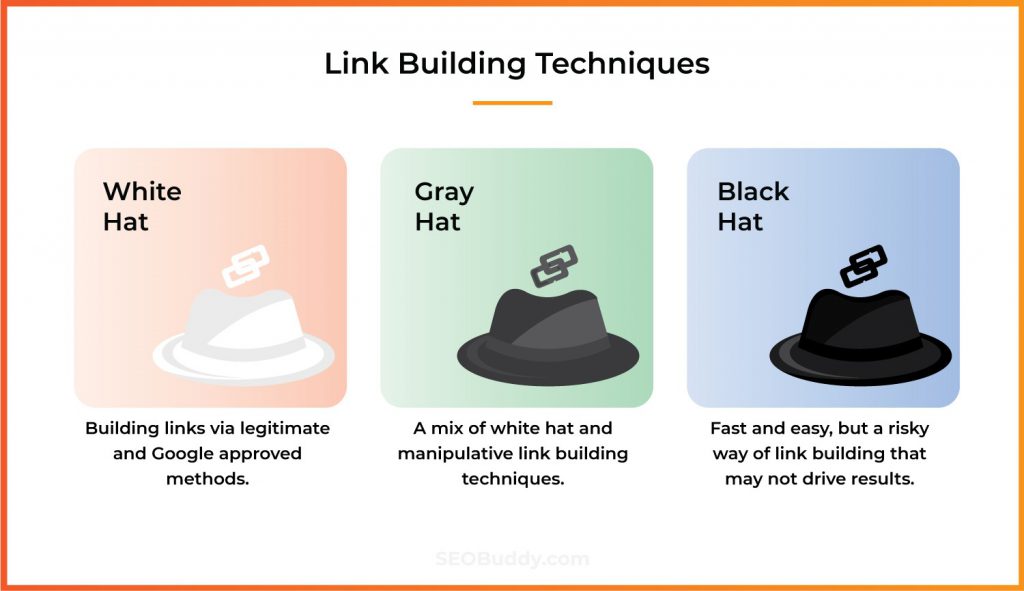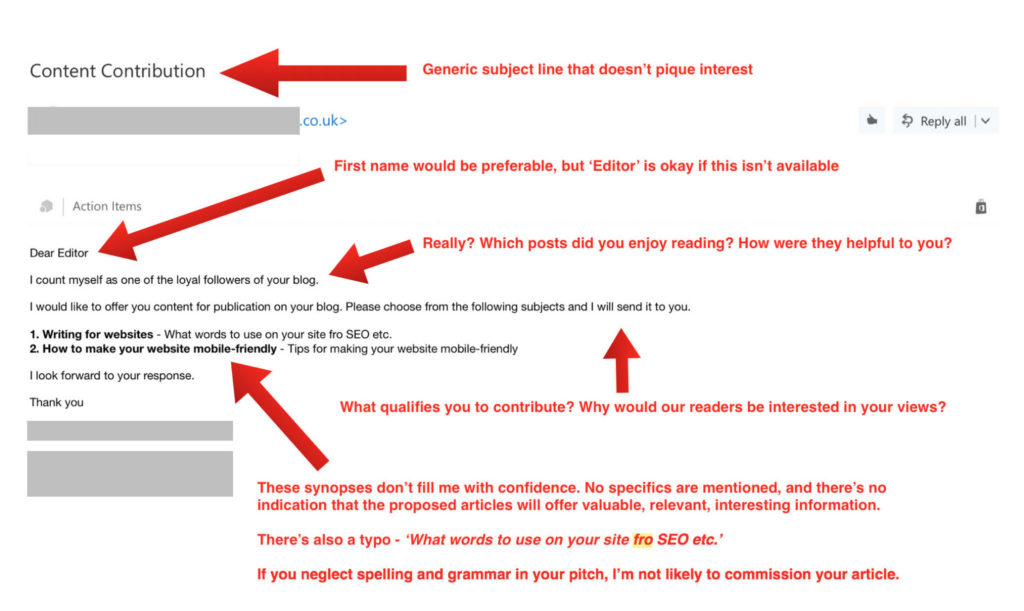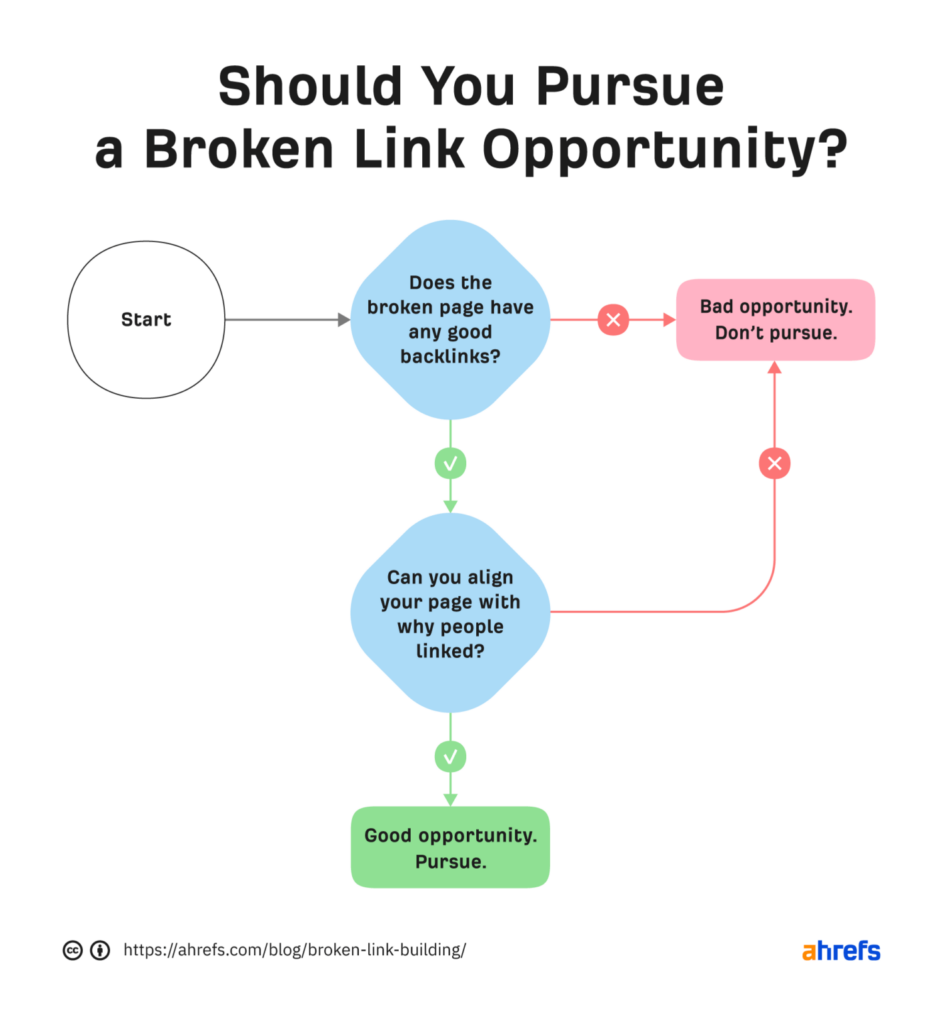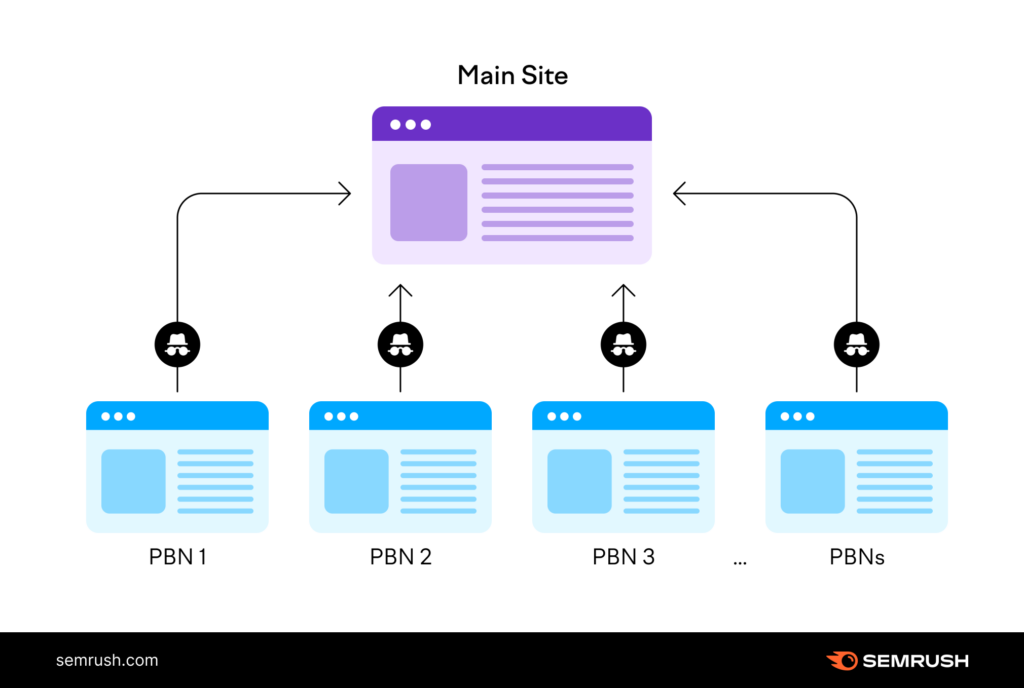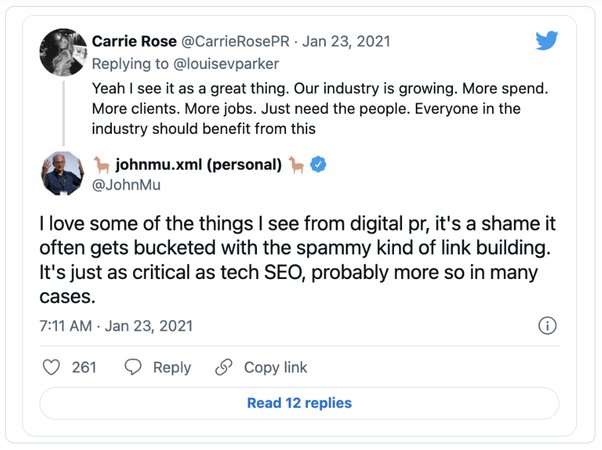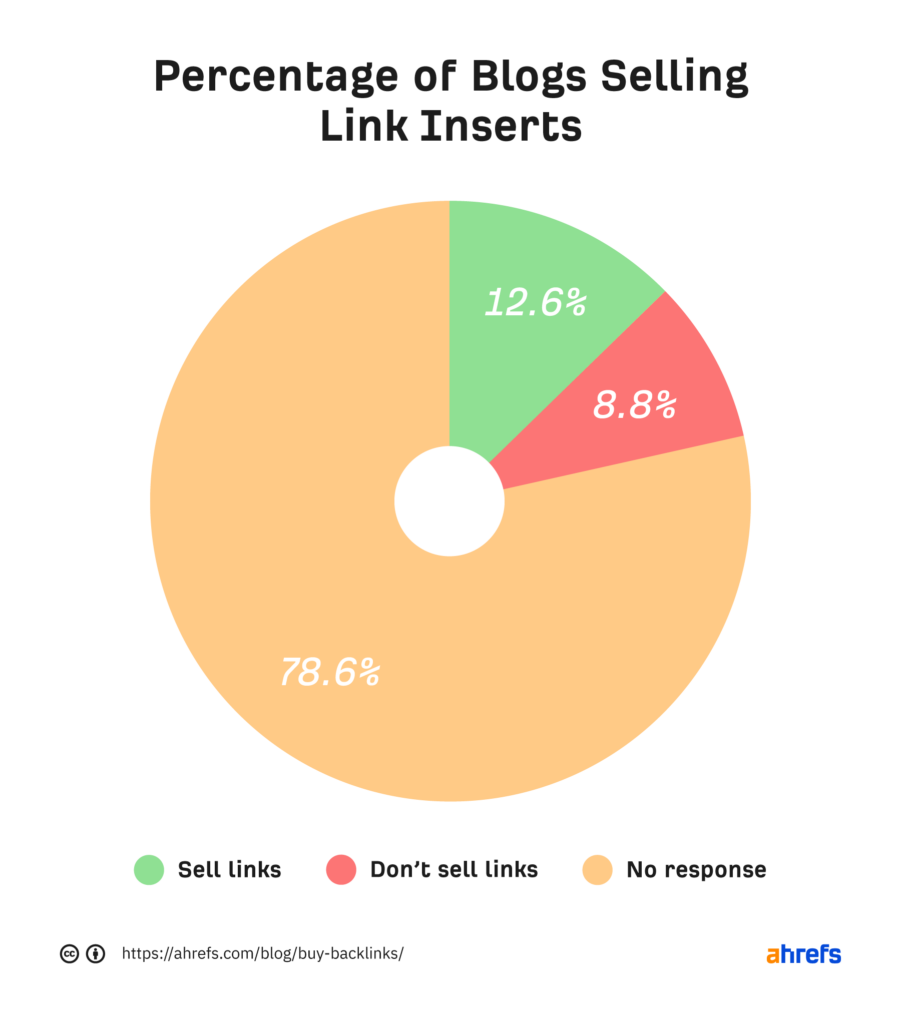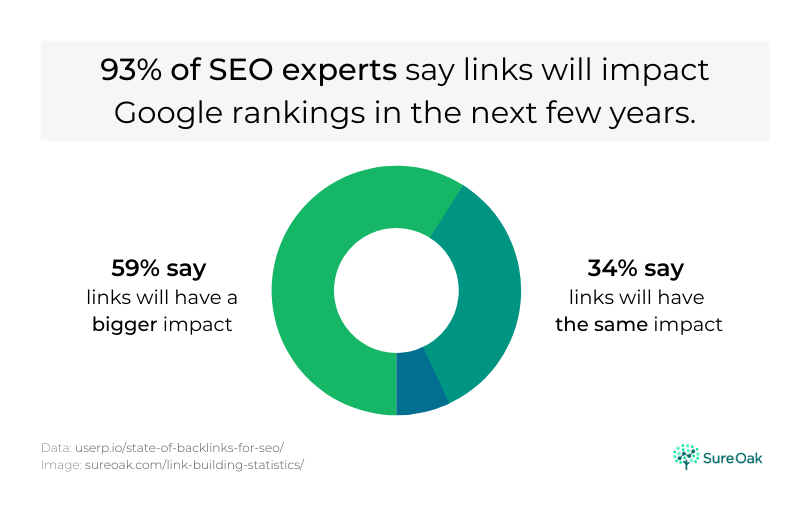SEO links play a critical role in improving SEO performance. In the advertising industry, there is an abundance of link building service providers, making it quite challenging to identify a trustworthy and high-quality link building provider.
Research conducted by Userp reveals that websites occupying the top position in search results have an impressive 3.8 times more backlinks than those ranking between positions 2 to 10.
Unfortunately, many link building agencies resort to black hat techniques. Although these tactics might yield short-term results, they pose a significant risk to your website’s long-term traffic and could even lead to penalties from search engines like Google.
As a result, it becomes crucial for brands to exercise caution when selecting a link building service provider.
To help you navigate this landscape, it is essential to understand how to find a reliable link building service provider and to be aware of common pitfalls to avoid when acquiring backlinks.
What is link building?
Link building refers to the strategic process of acquiring high-quality links from external websites to your website. These links act as a vote of confidence from authoritative and well-established websites within your industry. Search engines like Google, Yahoo, and Bing view these links as indicators of your website’s credibility and relevance.
Image credit: Semrush via Twitter
The number and quality of links from sites play a significant role in determining the ranking of your website’s pages in search engine results pages (SERPs). The more high-quality links a specific page receives, the greater its chances of ranking higher in search results.
When engaging in link building, it is essential to prioritize obtaining links from reputable, relevant, and high-authority websites. Search engines place trust in these websites, and having links from them can positively impact your website’s visibility and reputation.
Related: 8 Tips On How To Grow Organic Traffic
White hat vs. black hat links
Distinguishing between white hat and black hat link building practices is crucial in understanding the ethical aspects of acquiring links.
White hat links are obtained through methods that align with the guidelines and principles set by search engines. One example of a white hat approach is creating high-quality content on your website that naturally attracts attention and earns organic backlinks from other reputable sites over time.
Image credit: SEO Buddy
On the other hand, black hat links are acquired through practices that violate the guidelines established by search engines, such as Google’s Search Essentials (previously known as Webmaster Guidelines). Black hat techniques involve engaging in manipulative link building activities to boost a website’s reputation artificially.
For instance, paying other website administrators to place links back to your site, thus creating an artificial sense of credibility, is considered a black hat practice. These links are often unnatural and originate from spammy domains.
It is essential to adhere to white hat link building strategies to ensure long-term success and maintain a positive relationship with search engines. In contrast, black hat techniques can lead to penalties, a loss of reputation, and potential long-term damage to your website’s visibility.
The most common link building strategies
Some of the top white hat link building strategies consist of guest blogging, email outreach, and broken link building. Let’s explore these concepts in greater detail.
Guest post link building
Guest blogging involves a systematic approach that begins with identifying high-quality websites and contacting them via email, showcasing your expertise, and leveraging previously articles that you’ve published.
The key here is to create unique and valuable content using your expertise and leverage your past writing credentials. This often entails content creation and pitching the brand’s content using manual outreach software like Respona or Mailshake.
The key here is that the content needs to valuable, and not some kind of thin fluff piece. But here’s the thing, it is a form of white hat SEO, but it can also be black hat — let me explain.
Let’s say you use generic “write for us” searches using Google Search Operators then 80% of the time (or even higher), most of these sites will be low-quality paid sites — with the remainder of these being usually high-end news sites that are looking for expert opinions. So if a link building agency “pays for a link” from one of these sites, then its basically worthless as Google will devalue that link.
So you can see, there can be quite a big difference between authority links vs some paid guest post linking on a low-quality. Instead, it’s better to pitch “real brands,” with guest posts and contributor articles.
Related: 8 Effortless Ways To Brainstorm Content Ideas
Email outreach
Email outreach is a proactive approach that involves identifying relevant online content and contacting the respective owners via email to request the placement of your link on their website.
Image credit: Bespoke Digital
You can initiate contact with influential bloggers, educational sites, journalists, media publications, or high-authority websites that align with your business niche. You can request a link to an informative content piece on your website by contacting them.
To ensure successful email outreach, you must have outstanding content pieces on your website that offer substantial value and resonate with your target audience. Providing informative and engaging content increases the chances of receiving positive responses and obtaining valuable backlinks through email outreach.
Broken link building
Broken link building is a highly effective tactic for acquiring quality backlinks. This strategy involves identifying broken links on relevant websites, creating new content that matches the topic of the broken link, and then reaching out to the website owner to request a link to your new content as a replacement.
Image credit: Ahrefs
This approach creates a win-win situation for both websites involved. Acquiring a quality link improves your website’s authority and visibility. Simultaneously, the other website benefits from removing and replacing the broken link with an active one, enhancing its user experience and maintaining a seamless web browsing journey for its visitors.
Should you do link building yourself?
Link building may appear straightforward initially, but its intricacies become apparent once you delve into the process. Attempting link building with professional assistance, adequate knowledge, or guidance can help your website’s performance.
It is crucial to enlist the support of a professional link building company or a reputable SEO service provider to handle your link building endeavors. These experts possess the necessary expertise and experience to execute effective link-building strategies for your company.
Image credit: Serpstat
By relying on professionals, you can avoid pitfalls, stay up-to-date with the latest industry practices, and ensure that your link building campaign aligns with Google’s search engine guidelines. This proactive approach safeguards your website from potential harm and enhances your chances of achieving long-term success by creating a high-quality backlink profile.
Related: Shopify SEO: Is It Worth Hiring An Expert?
8 pitfalls to avoid when selecting a link building agency
Choosing an inexperienced link building service provider can jeopardize your business’s reputation and even result in penalties from Google.
One common mistake is selecting a provider based solely on price without considering their expertise, experience, and track record of success. Another pitfall is partnering with an agency that uses black hat techniques or outdated strategies that violate search engine guidelines and could harm your website’s performance in the long run.
Let’s look at some of the questionable practices of certain SEO agencies to increase your awareness and knowledge in this area. By understanding these tactics, you can make more informed decisions.
1. Building links from private blog networks (PBNs)
Google has implemented strict measures to devalue and penalize links obtained from PBNs.
Usually, this involves purchasing expired domains with high authority and constructing websites solely to build links to other sites without providing any valuable content or positive user experience.
Image credit: Semrush
These PBNs are designed to manipulate search engine rankings by artificially generating backlinks. However, acquiring backlinks from such networks will not yield any positive results. It can be detrimental to your website’s performance.
Google no longer considers links from PBNs as valid or reputable, and excessive reliance on these links can lead to Google penalties and a significant decline in your website’s visibility and rankings.
2. Acquiring links from Web 2.0 sites
Web 2.0 links are generated by creating content on platforms such as Medium, Quora, Reddit, Blogger, Tumblr, Slideshare, and others. Relying on Web 2.0 platforms is considered an outdated strategy.
Google Search Advocate John Muller described Web 2.0 style links as ‘spammy,’ further validating their lack of efficacy.
Image credit: Quora
Web 2.0 links generally do not offer much value from an SEO perspective. However, some links can generate referral traffic, which can still benefit your website.
For instance, consider a scenario where someone is searching to gather more information about a particular topic. If a Quora post appears as a search result on Google, users might click on that link, read the content within the Quora post, and potentially navigate to a website from there.
3. Building links from link farms
Google strongly emphasizes the quality of information and the reputation of businesses when determining search engine rankings. If your website offers high-quality and engaging content that resonates with users, Google will be more inclined to reward you with improved rankings. However, the opposite holds for link farms.
Link farms refer to a network of websites that interlink with one another solely to boost their popularity artificially. These sites do not provide valuable information to users and instead focus on selling links within their network.
It’s important to note that link farm links are not natural or organic. If a significant portion of your backlinks originates from link farms, it can harm your business’s reputation and long-term organic rankings.
4. Building links only to your homepage
Ideally, the distribution of links should reflect a healthy ratio, such as 30% directed to the home page, 30% to product or service pages, and another 40% to blog pages. It should always appear clear.
For example, if 98% of links point to the home page, then this could be a red flag to Google that you’re trying to manipulate rankings. As a result, it may hinder your website’s overall organic performance, and even result in a massive loss of your website’s search traffic.
5. Buying links
Buying links is a highly harmful tactic that directly impacts your website’s ranking. Google has made it clear that you should never buy backlinks to raise your organic rankings.
Agencies selling links will often sell links, but not so many share with targets in advance or share samples of links that they’ve got for themselves or their clients.
Image credit: Ahrefs
Many agencies may claim to sell links, but they often need to provide sufficient transparency by not sharing information about their targets in advance or providing samples of the links they have obtained for themselves or their clients.
6. Building links through blog commenting
When done right, blog commenting can be a valuable strategy to enhance brand awareness and demonstrate your expertise on a particular subject. This only works if the comment is genuine.
Posting generic comments on other blogs to get a link is web spam. There used to be tools to do bulk mass blog commenting spam.
Unfortunately, some agencies still offer blog commenting packages that involve building many blog comment links.
7. Avoid generic link lists
Many link building service providers offer lists of sites for creating backlinks. But beware of email spammers who sell low-quality links from paid sites or private blog networks (PBNs).
On the other hand, some agencies may have link lists that include valuable sites. If you come across a link list, quickly review it. If you see unfamiliar sites, it’s best to avoid that service. However, if the list includes well-known and trusted brands, it could be a positive sign that the link building service provider is reliable.
The key is to be discerning and evaluate the quality of the sites in the link list. By doing so, you can avoid spammy practices and find a link building service with a track record of delivering good results.
8. Building links on sites with a “write for us” page
Some link agencies search on Google for sites with a “write for us” page and approach them with guest post pitches. These sites generally fall into two categories:
- Low-quality: These are websites that accept any piece of content. They often engage in practices such as selling links or charging fees for publishing content. Many of these sites are specifically created for the sole purpose of selling links.
- High-quality: These include reputable sources like news sites that seek expert opinions. However, these types of sites are usually not easily accessible for most link builders.
Instead of targeting sites with a “write for us” page, a more effective approach is to focus on big brands that have established trust and recognition. These brands usually need to display on their website that they accept guest post content and offer more valuable link building opportunities.
How to choose a link building service provider?
Now that you know the links requiring extra caution, let’s explore the essential factors before choosing a link building service provider.
To help you find the perfect link building partner for your business, here are some friendly tips to keep in mind:
1. Check reviews
When selecting a link building company, checking out their reviews is always a good idea. A reputable link building service will often have more positive reviews, which you can easily find by searching their company name on Google.
Take the time to read through as many reviews as possible. It’s important to consider both the positive and negative feedback. Doing so can give you valuable insights into why people are satisfied or dissatisfied with the service.
Remember, the more reviews you read, the better your understanding of the link building company’s reputation and the quality of its services. So, take a friendly approach and make sure to dig deep into the reviews before making your decision.
Related: The Best SEO Consultant: Top 5 Things To Look For In 2023
2. Check their connections and reputation
To evaluate a link building service provider, it’s essential to understand their connections and affiliations. You can easily gather information by searching the company’s or owner’s names on LinkedIn or Google.
Look for indications of the company or founder’s reputation and connections with reputable businesses. Here are some questions to consider when doing research:
- Have they published content on top industry blogs?
- Do they have positive ratings from former employees?
- What is the owner’s level of experience?
- How long has the agency been operating?
- Do they have strong industry connections on LinkedIn?
You can gain valuable insights into the link building company’s background by finding answers to these questions.
3. Check an agency’s portfolio and case study
You should check the link building case studies posted on the agency website.
When selecting a link building agency, review their case studies. These studies provide insights into past clients and achieved results, showcasing their strategies and capabilities.
Focus on case studies related to your industry. If the agency has a proven track record of success with companies in your niche, it demonstrates its understanding and effectiveness in driving results.
Consider their experience across diverse domains. Consistent positive outcomes in different industries indicate their expertise in link building. During your initial consultation, inquire about their clientele and notable achievements.
4. Contact their customers
Once you’ve reviewed the company’s portfolio, case studies, and customer testimonials, you’ll have information about the service provider’s clients. You can use this information to reach out to some customers and gather feedback about their link building and SEO strategy.
Ask them about the link quality and customer service. This will give you a reliable assessment of the company’s overall service.
5. Check their website
To gain insight into the skills of a link building company, take a close look at their website. Pay attention to details like how well-optimized it is, the quality of the content, how quickly it loads, the smart use of keywords, and how easy it is to navigate.
Remember to check if they have any awards and consider how long they’ve been in the industry. You can usually find this information on their website.
To assess the quality of their links, they rely on helpful tools like Semrush, Ahrefs, Ubersuggest, and Moz.
If you notice that their website lacks authority and doesn’t have links from reputable domains, it could be a warning sign. It might indicate that they need help to secure links from high-quality sites.
However, keep in mind that it could also mean that the company is relatively new or doesn’t have enough resources to market its agency as they’re spending all of its time on client work. That’s something you’ll come across quite often in the agency world.
6. Compare pricing
When selecting a link building agency, a brand should compare pricing options. Here’s why:
- Cost-effectiveness: By exploring different agencies and their pricing structures, brands can ensure they get the best value for their investment.
- Transparency: How transparent are they with the link building service? For example, clients can pre-approve link targets, show pending links, etc.
- Quality assurance: Low pricing might indicate a need for more expertise or the use of questionable tactics, while significantly higher pricing may only sometimes guarantee superior results.
Related: E-Commerce SEO Agency: 5 Steps To Hire The Best Agency
7. Ask your agency about their link building strategies
Inquiring about an agency’s link building strategies is essential when selecting a link building agency. Understanding their approach and methods allows you to evaluate their compatibility with your brand’s goals and values.
Image credit: SureOak
Asking about their strategies allows you to ensure they employ ethical and sustainable practices that won’t result in any negative consequences.
Here are some of the questions you should ask them:
- Do you have experience working in our industry?
- What is your most significant achievement so far?
- Have any of your clients been penalised by Google?
- What SEO tools do you use?
- What link building techniques do you use?
- How do you evaluate the quality of a link target?
- How do you ensure the links you build are natural?
- What are the latest link building trends?
- Can we check and approve the sites before you begin a link building campaign?
- What kind of reports do you provide?
- How often will we meet to discuss link building progress?
- Do your guest posts target keywords a website doesn’t have, and is your content optimised and humanised?
- Do you offer HARO link building services?
- What is the average Domain Authority (DA) for the links you built?
The more questions you ask, the better equipped you’ll be to evaluate a link building agency. So don’t hesitate to ask questions and gather the information you need to make the right choice.
Summing up
Link building is a time-consuming and effort-intensive process. Allowing your link-building team the necessary time to achieve results is crucial. Patience is key to success.
It can be challenging when searching for a dependable link building services provider. Before finalizing a partnership with an agency, take the time to evaluate their services thoroughly.
By carefully scrutinizing the offerings of a link building company, you not only have the opportunity to save money in the long run but also protect and maintain the reputation of your business.
Are you looking for a reputable SEO agency that gets results? Then contact Aperitif Agency today to find out how we can deliver long-term growth for your business.

